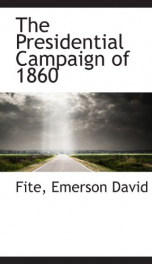the presidential campaign of 1860

Purchase of this book includes free trial access to www.million-books.com where you can read more than a million books for free. This is an OCR edition with typos. Excerpt from book: CHAPTER II Helper's Impending Crisis And The Speakership Contest M December 5, three days after the execution of Brown, while the country was still under the spell of the unusual passions and excitement aroused by that dramatic event, the Thirty-sixth Congress of the United States met in its first regular session. In the House of Representatives, where the first duty was to effect organization, balloting for speaker began almost at once, one hundred and seventeen votes being necessary to a choice. In the first ballot Bocock of Virginia, the leading Democratic candidate, received eighty-six votes, Sherman of Ohio and Grow of Pennsylvania, the Republican candidates, sixty-six and forty-three votes respectively. When the result of this ballot was announced, Clark of Missouri arose for remarks, and after some confusion, incident to the fact that in the absence of a regular speaker the temporary presiding officer, the clerk, refused to decide points of order but insisted that the House should decide for itself, he introduced the following resolution: "Whereas, certain members of this House, now in nomination for speaker, did indorse the book hereinafter mentioned, Resolved, That the doctrines and sentiments of a certain book, called The Impending Crisis in the South, How to meet It, are insurrectionary and hostile to the peace and tranquillity of the country, and that no member of this House, who has indorsed and recommended it, is fit to be speaker of the House." In this way an antislavery book, written by a poor white of North Carolina, was suddenly raised into national prominence ; it had first appeared in 1857 without attracting attention, had later been severely castigated in the Senate of the United States without widespread comment, and with the indorsement of sixty-ei...
Info about the book
Author:
Series:
Unknown
ASIN:
111213140X
Rating:
3/5 (3)Your rating:
0/5
Languge:
English
Users who have this book
Users who want this book
What readers are saying
What do you think? Write your own comment on this book!
write a commentif you like the presidential campaign of 1860 try:
Other books by this author
Do you want to exchange books? It’s EASY!
Get registered and find other users who want to give their favourite books to good hands!


